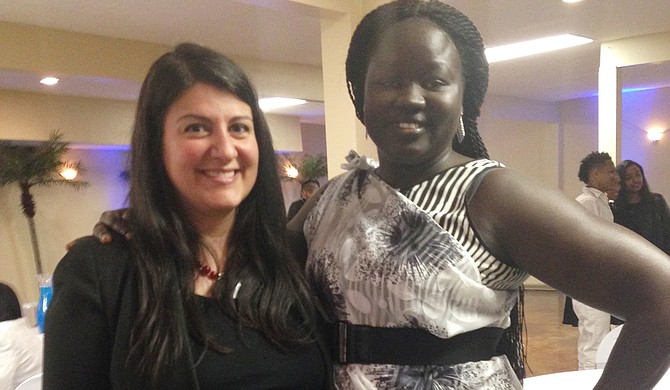Nina Ghaffari (left) and Akech Garkouth (right) pose at the Emancipation Celebration on Wednesday, Dec. 7; both of them work for the Catholic Charities Unaccompanied Refugee Minor Program in Jackson, and Garkouth is a former refugee minor who went through the program. Photo by Arielle Dreher.
JACKSON — Akech Garkouth could not read, write or speak English when she arrived in the United States. She had been on the move for years, moving from refugee camp to the next with her mother. Originally from South Sudan, Garkouth applied for refugee status in the U.S. and was lucky to be selected, and after a long application process, she left Kenya where she was staying at that time and came here in February 2009.
Garkouth was 16 years old when she finally left her war-torn country, made unsafe by the constant conflict between Sudanese and South Sudanese fighting over natural resources and religious differences. South Sudan gained its independence in 2011, but the fighting continued even after Garkouth left, and she said there are still refugee camps in and around her home country. Garkouth was sent to Jackson for resettlement in the Unaccompanied Refugee Minor Program that Catholic Charities runs in the state.
The Mississippi program was one of several programs established in the 1980s to address the needs of thousands of children in southeast Asia, primarily Vietnam at the time. It is one of 19 programs nationally that resettle refugee minors in the U.S. The federal Office of Refugee Resettlement funnels funds to states with unaccompanied minor refugee programs.
Children at the program in Jackson are technically in the Mississippi Department of Child Protection Services legal custody, but Catholic Charities maintains physical guardianship of the youth.
The program helps refugee minors adapt to life in the U.S. with intensive tutoring and counseling services as well as providing the young people with living arrangements, either in group homes or therapeutic foster homes—both specifically for refugee youth. Students in the program receive English as a Second Language courses as needed and are encouraged to enroll in educational programs, whether that be public school or other high-school equivalency degree programs.
Garkouth went from arriving with a sign hanging around her neck that said "I can't speak English," an experience she said was humiliating, to mastering English and graduating from Callaway High School in 2013. She didn't stop there, however, and worked her way through community college. She received her associate's degree this summer from Hinds Community College and is now working on her bachelor's degree in business administration at Mississippi College.
"I was constantly struggling because I couldn't read or write well," Garkouth said. "It's a matter of wanting something because it was something I wanted so that's what really pushed me."
From Trauma to Success
On Dec. 7, four refugee minors stood to receive plaques for their participation in the URM program. Their peers from around the world, foster parents and community advocates filled a Jackson meeting hall, decorated in rich winter blue with crystal chandeliers hanging from the ceiling. The crowd celebrated the four young adults who will be emancipated in the coming year.
Mississippi's refugee foster-care laws allows refugee minors to stay in the State's custody until they turn 21 years old.
Refugee youth face an array of different challenges when they come to this nation. Depending on their country of origin, unaccompanied minors often are not allowed to go back to live in their country of origin and receive their green cards through the program. Young people can eventually gain American citizenship if they desire, after they have had legal permanent residency in the U.S. for five years, which requires revoking citizenship of their home countries.
Garkouth did this recently, and she is now an American citizen.
Many of the refugee children are not orphans and leave family behind in their home countries. Garkouth started working as soon as she mastered English—and today she works at one of the URM group homes as a program specialist, helping the young people at home with homework, feeding them meals and offering support when needed. Garkouth sends some of her earnings back to her mother, who is living in a refugee camp in Uganda.
Debra West, the URM Jackson program director, said the goal of the program is to get the minors to the point of self-sufficiency. One of the best rewards of the program is seeing former students come back to the program as foster parents or work at the group homes like Garkouth, she said.
"I don't really consider this a job, I consider it more of a calling," West told the Jackson Free Press.
West said her program is one of the smaller refugee minor programs in the country, and they can take up to 40 young people at a time.
Currently, 35 students are in the program from three different continents. The program, while rewarding work, does not come without challenges. Many refugee minors coming to the U.S. have high maturity levels, after exposure to traumatic events at young ages and coming into a more structured environment can be difficult, West said. Some of those young people leave the program at the age of 18.
Garkouth says the kids she went through the URM program with and the children she works with now are some of the hardest-working people she knows.
"I think we should value humanity in general," Garkouth says. "Most people come to America (as refugees) to have a better life and find a job."
Email state reporter Arielle Dreher at arielle@jacksonfreepress.com.



Comments
Use the comment form below to begin a discussion about this content.